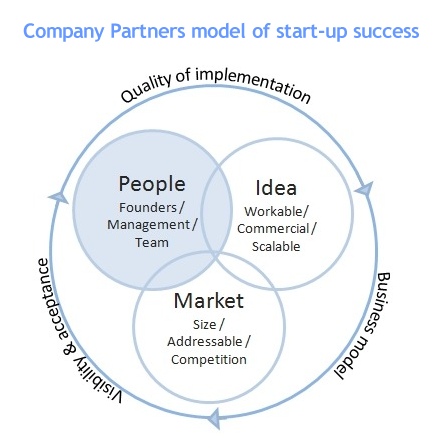
Every experienced Investor develops a sixth sense when looking at potential business opportunities, but even so it can sometimes be difficult to put your finger on what is the key ingredient in making a new venture successful.
Over the years of working with start-ups I’ve seen companies grow rapidly and then fall away, great businesses that not only grew but sustained their position and of course those that never made it.
In all of the great ventures they got 3 basic elements right and I’ve tried to show those essentials on our model of Start-up Success above.
Much of it is common sense, but like many simple things it can often be forgotten and the whole process of identifying a good high growth business made over complicated.
Firstly, yes you guessed it, is the founders of the venture. It’s said many times that the management team is key, but why? It is because they provide the drive, ambition and ultimate quality of the business.
Not only must they have the will to succeed but also the competence to implement the business successfully. The idea is important, but the excellence of implementation of the idea is critical.
Great entrepreneurs have a vision of what they want to achieve based on an insight to a market opportunity and the capability to pull together the resources to address it.
When you as an Investor look at prospects, or perhaps if you are an entrepreneur thinking through options for starting a business, it’s worth remembering the 3 key ingredients and how they interact for sustainable success.

I agree that the founders of a business provide the drive to take it forward, but the underlying guide to long term success has to be whether the demand for the product is in growth or decline. It is possible for quite ordinary people to be “successful” when the market conditions are in their favour but equally for extraordinary people to fail if they refuse to accept that demand for their product is in decline. All ‘successful’ businesses ultimately fail – look at Woolworths, HMV, Clarkes along with many brand names that fall out of fashion. The key to success is understanding when to get out.
Very true. In fact one of the most difficult posts to fill when a company gets a bit bigger and can justify a CEO is someone who can execute that role well. It is, in my opinion, much harder to run a small company than a large one. You really have to be on top of everything and be good at motivating and uniting your team, all with relatively scarce resources. It’s nearly as hard as finding a good sales director, a truly rare breed.
I recall a model from a session some years back at Henley management collage, which I think was originally developed by Yale business school .This identified the cyclical growth and plateau nature of all businesses and in consequence the need for continuous review and change. The most depressing comment I hear from many often failing businesses is that “ We have always done it this way” One certain law of nature is entropy which equally applies to business.
Start up business’s need COURAGE: need strength: need strong belief in their product. It’s fair to say it can be a gamble at times, especially in periods of recession. It’s the perseverance that counts and it’s an up and down journey, despite having researched the market and there being a definite need; but any product that is a different concept, the obstacles can be difficult due to people resisting change. This is where the perseverance steps in with continual proving, and stamina tested to maximum.
Resource outlets are taken to the hilt – not just money, but strength and will, and sweat. Any literature, online tips, seminars explaining the paths to success acts as a good tiller – yes – but remember these words are not related to your actions and experience straight off and there is nothing about the mountains that you need to climb on the way. It’s not easy and no-one should ever say “Aren’t you lucky?” if ever your business becomes a resounding success.
Teams of people within any business are of absolute importance, adding more credibility and strength, but you have to pay them! and it’s not until you’re a little way down the line affordability is possible. It’s all a vicious circle – like advertising and getting known in exhibitions. People don’t know about you unless you dig out supportive finance to get you known, but how long will this take? it doesn’t happen tomorrow. People don’t trust “new things ” and are suspicious, even mocking until you’ve been on the scene regularly, and then they think “Oh! there maybe something in this”! By then it’s set in concrete and you’ve convinced them. But then how far afield would it eventually take you from one small geographical area within this wide world?
It’s not an easy route but with resilience seeing a business grow bit by bit, steadily and surely is truly satisfying, but you have to have guts! And there comes a time when you have to make big decisions and learn a new business strategy. These are experiences based without financial support schemes and purely on self finance.